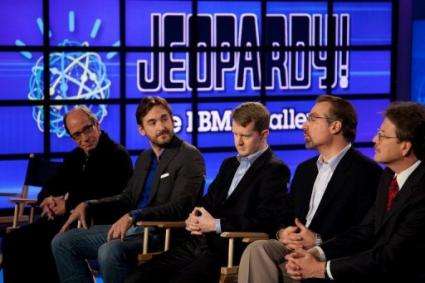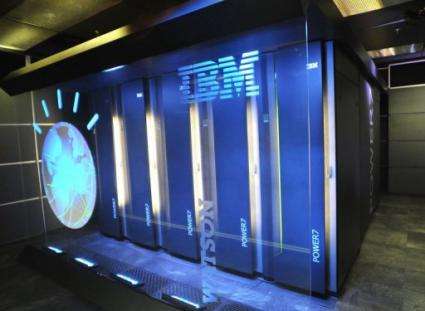IBM's 'Watson' to take on Jeopardy! champs

Nearly 15 years after an IBM machine defeated world chess champion Garry Kasparov, the US computer pioneer is rolling out another device to challenge mankind.
Watson, a supercomputer named for IBM founder Thomas Watson, is to take on two human champions of the long-running Jeopardy! television quiz show in two games over three days next week. The three "Jeopardy!" episodes featuring Watson will air Feb. 14 through Feb. 16.
Like Kasparov, who lost a six-game match to IBM's "Deep Blue" in 1997, Ken Jennings, who holds the Jeopardy! record of 74 straight wins, and Brad Rutter, winner of $3.25 million on the show, are expected to have their hands full.
In a practice match at IBM Research headquarters in upstate New York last month, Watson came out on top in terms of prize money, although the computer and the two human contestants correctly answered all of the 15 questions.
Jeopardy!, which first aired on US television in 1964, tests a player's knowledge of trivia in a range of categories, from geography to politics to history to sports and entertainment.
In a twist on traditional game play, contestants are provided with answers and need to supply the questions.
During the practice match, for example, one of the clues was: "The film Gigi gave him his signature song 'Thank Heaven for Little Girls.'"
Watson, represented by a large computer monitor, sounded the buzzer a split second ahead of Jennings and Rutter and answered correctly in its artificial voice "Who is Maurice Chevalier?"
A dollar amount is attached to each question and the player with the most money at the end of the game is the winner. Players have money deducted for wrong answers.

Watson, which is not connected to the Internet, plays the game by crunching through multiple algorithms at dizzying speed and attaching a percentage score to what it believes is the correct response.
For the Maurice Chevalier question, for example, Watson was 98 percent certain that the name of the French crooner was the right answer.
Developing a supercomputer that can compete with the best human Jeopardy! players involves challenges more complex than those faced by the scientists behind the chess-playing "Deep Blue."
"The thing about chess is that it's fairly straightforward to represent the game in a computer," said Eric Brown, a member of the IBM Research team that has been working on Watson since 2006.
"With chess, it's almost mathematical," Brown told AFP. "You can consider all the possibilities. It's almost a closed set of options."
Jeopardy!, on the other hand, involves the use of natural language, raising a whole host of problems for a computer.
"Questions are expressed in language and with an ability to be asked in an infinite numbers of ways," Brown said, including the use of irony, ambiguity, riddles and puns -- not a computer's strong suit.
"The initial approach that people might want to take is to just build a giant database," Brown said. "That approach is just not suitable."
Playing Jeopardy! is also not like searching the Web.
"While they're somewhat related, Google and Watson are solving two different problems," Brown said.
"With Web search, you express your information with a few keywords and then a search engine will bring back 10 or half-a-million Web pages that match what you're looking for.
"But if you're looking for precise information (like with Jeopardy!) you'll have the task of wading through those documents to find the answer that you're looking for," he said.
Watson uses what IBM calls Question Answering technology to tackle Jeopardy! clues, gathering evidence, analysing it and then scoring and ranking the most likely answer.
The winner of the man vs. machine showdown which begins on Monday is to receive $1 million. Second place is worth $300,000 and the third place finisher pockets $200,000.
IBM plans to donate 100 percent of its winnings to charity. Jennings and Rutter plan to give 50 percent of their prize money to charity.
(c) 2011 AFP



















